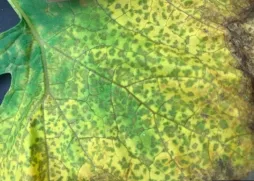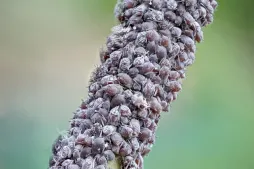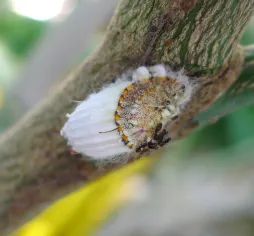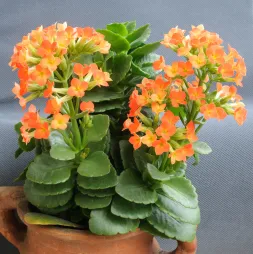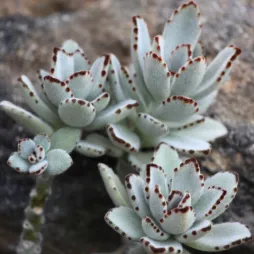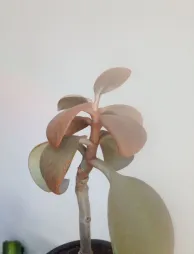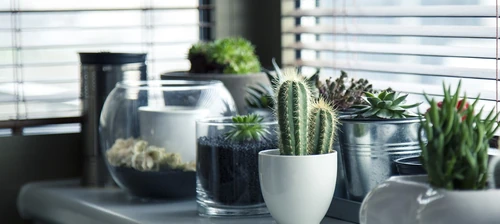Kalanchoe daigremontiana, a natural curiosity
Some plants seduce by their beauty, others by their originality. Such is the case of Kalanchoe daigremontiana, a Crassulacea native to South Africa. With its foliage bristling with propagules, this plant is sure to arouse curiosity.
How to recognize Kalanchoe daigremontiana, the Kalanchoe of Daigremont?
A succulent plant with an upright habit, Kalanchoe daigremontiana reaches a height of 1.5 meters in the wild. Indoors and in pots, it rarely exceeds 60 centimetres.
Kalanchoe daigremontiana has an upright, unbranched stem. On the lower part, you can see the leaf scars left by the oldest leaves.
Opposite, thick, fleshy leaf blades grow on the upper part. Triangular, they measure up to 20 centimetres long and four centimetres wide. The green leaves are streaked with brown and purple on the reverse. Their crenellated margins bear outgrowths called propagules. These are seedlings which, when they fall from the leaf blade, take root in the soil to give rise to a new plant.
The Kalanchoe de Daigremont flowers from the age of two. Clusters of violet, orange and red flowers emerge at the end of a 40-centimetre flowering spike. Tubular, they resemble drooping bells.
The plant is just as dangerous as blossfeld's Kalanchoe and thyrse flowered Kalanchoe. If ingested, it causes damage to the nervous and muscular systems. But it is also toxic to the touch. Remember to wear gloves when handling it.
Finally, even if you live in a region with mild winters, avoid planting it in the ground. Thanks to its adventitious roots and bulblets, the plant reproduces rapidly. The species has been classified as invasive in Hawaii, Cuba, Puerto Rico and Australia.
Our maintenance tips
Although daigremont Kalanchoes can't stand the cold, they adapt very well to the dry air of our apartments, even in winter. Regular watering and a little care are all it takes to grow them indoors.
Watering
Water when the soil is dry, for about three centimeters. Use room-temperature, non-calcareous water, preferably rainwater. When watering, avoid wetting the leaves.
Thirty minutes after watering, drain off any stagnant water in the saucer. It may rot the roots.
To improve humidity, place your Kalanchoe daigremontiana with your other plants or place its pot on a dish of moist clay balls.
Repotting
Every spring, repot your Kalanchoe daigremontiana to give it more space.
Get a pot with holes in it. Over time, foliage can become imposing. To prevent its weight from tipping the container over, choose a heavy model, in terracotta or ceramic for example. Line the bottom with pebbles.
This variety appreciates rich, well-drained soil. You can combine potting soil for flowering plants or heather soil with perlite or pozzolan. Pour in a layer of substrate, then plant your specimen in the center. Fill in with the rest of the mixture.
Water for the first time to eliminate air bubbles and encourage rooting.
Fertilization
To promote the growth of your Kalanchoe daigremontiana, apply fertilizer in spring and summer.
Add flowering plant fertilizer to watering water.
Prune
Mulch the base of your Kalanchoe daigremontiana to protect it from the cold. Preferably use organic matter. As it decomposes, it enriches the soil.
Cutting
Cutting is carried out during the strong growth phase, generally in spring and early summer.
Once in the ground, propagules develop their own root system. Dig them up when they are two to three centimetres long.
Prepare a pierced pot with a bed of clay balls at the bottom for drainage. Pour in a mixture of sand and potting soil. Preferably use a horticultural or seedling potting soil, as these are rich in nutrients. Plant your graft in this pot.
Place your cutting in a bright spot away from direct sunlight and water.
Diseases / Threats
Information
| Family | Crassulaceae - Crassulaceae |
| Type | Kalanchoë - Kalanchoe |
| Species | Kalanchoe of Daigremont - Kalanchoe daigremontiana |
| Lifecycle | Perennial |
| Foliage | Evergreen |
| Exposure | |
| Substrats | |
| Planting method |
In pots |
| Categories | |
| Tags |
Beginner Invasive Flowery Toxic |
| Origin |
South Africa |
| Hardiness (USDA) | 9b |
| Leaf color |
|
| Flower colors |
|
Discover plants from the same family











